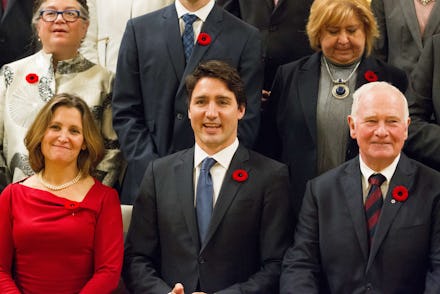Canada's Prime Minister Demands Equality In His Cabinet, And He Shouldn't Be The Exception

When Canada's newly appointed prime minister, Justin Trudeau, was sworn in to office on Wednesday, he announced that he had daringly appointed 15 of his 30 cabinet roles to women. His decision inspired widespread coverage and praise — perhaps understandable, given that the choice is unprecedented in Canadian history and an anomaly in the context of male-dominated global politics. But while Trudeau's appointments are certainly commendable, they shouldn't be exceptional: In fact, equal representation should simply be the status quo.
Trudeau is the exception. "It's important to be here before you today to present to Canada a cabinet that looks like Canada," Trudeau said of his appointees on Wednesday, according to the Guardian. Such equitable political representation should be incorporated in cabinets and other political bodies the world over, and yet the global reality hardly reflects this. Only 22% of all national lawmakers around the world were female as of August, and 17% of cabinet members were women as of January, according to United Nations Women. A 2014 study found that at the current rate of progress, it will take the United States in particular an incredible 500 years to achieve gender parity in politics, the Nation reported.
The prime minister also made the effort to represent his nation's citizens by accounting for racial diversity: He assigned two aboriginal members — including a native woman as the new minister of justice — and three Sikh politicians to his cabinet.
This choice is an encouraging step given that a Canadian study released earlier this year showed the previous Parliament failed to represent the Canadian people and, as the study's author told the Star, likely resulted in decisions that were "uninformed and/or not reflective of the general population."
Beyond parity: Trudeau's appointments do not just numerically reflect the nation, but also combat deeper biases about leadership. When women are granted opportunities to lead, they frequently occupy roles stereotypically deemed feminine: Of the 17% of government ministers who are women, the majority oversee social sectors like education and family, according to U.N. Women.
Yet studies also show that women's leadership in historically male-dominated realms can be vital. Take finance, for example: Women fill less than 20% of bank board positions hold only 3% of bank CEO roles, according to the Telegraph. Yet a 2013 Commission on Banking Standards study recommended that the banking industry ameliorate its "overwhelmingly male" culture, and other studies have questioned if the global financial crisis would have happened had more women occupied economic leadership positions.
That Trudeau notably appointed a man, Jean-Yves Duclos, as Canada's minister of Families, Children and Social Development and a woman, Chrystia Freeland, to be in charge of international trade, therefore, are important contributions to disrupting this status quo.
You can't be what you can't see. Ultimately, Trudeau's appointments aren't just models for how current governments can better reflect their own populations, but also provides a crucial model for future generations. Many have previously argued that representation is critical to encouraging girls to pursue careers in male-dominated fields across the board, and politics are no exception.
As Marie C. Wilson, founder of the White House Project — an organization that aimed to encourage women to pursue political leadership in the U.S. — has said, "you can't be what you can't see." That Trudeau has proven to young Canadians, as well as young adults the world over, that equitable political representation is possible is meaningful and will hopefully have a significant impact on generations to come.